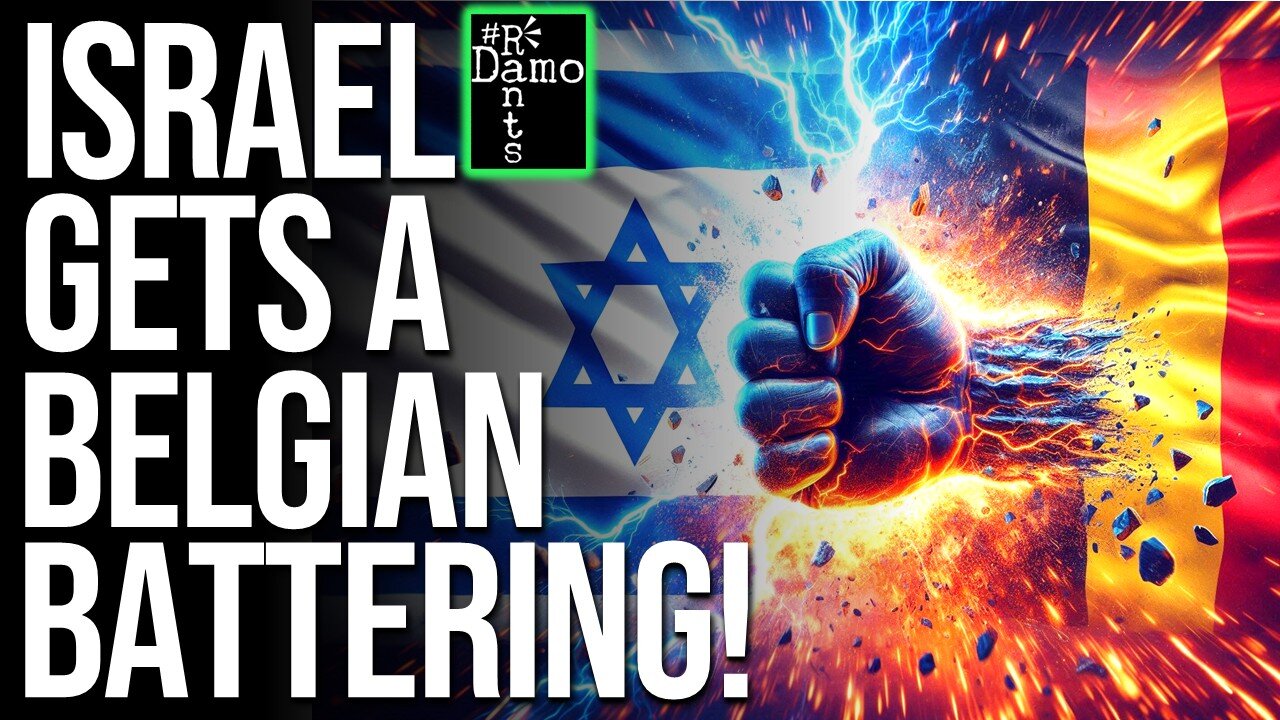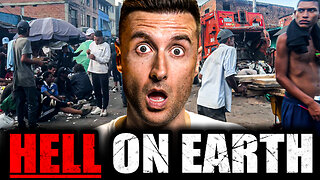Premium Only Content

They Never Thought Belgium Would Speak Out - They Were Wrong
Right, so in diplomatic life, silence can often be mistaken for civility, and inaction for neutrality. But then there are moments when silence becomes complicity, and when those trained in matters of discretion, as a result of that, feel compelled to speak out instead. Belgium has now reached such a moment it would seem. You see Belgium now finds itself entangled in a moral and legal crisis and the crisis in question is of course of global significance: how to respond to Israel’s conduct in Gaza, which the International Court of Justice (ICJ) has declared may plausibly amount to genocide.
This reckoning as far as Belgium goes has come about as a result of two unprecedented events. First, there arrest and interrogation of two Israeli nationals—one of them an active-duty soldier—at the Tomorrowland music festival, under universal jurisdiction laws, which made headlines around the world as a European first. Secondly though, there has been the striking and coordinated intervention of no fewer than 21 former Belgian diplomats and ambassadors, who have now come out and publicly demanded that their government impose sanctions on Israel, recognise the State of Palestine, and take concrete steps to end Belgian complicity in Israel’s actions. European complicity in Israeli actions just continues to crack up and not before time either.
Right, so Belgium is shifting more and more proactively against Israeli complicity for those genocide crimes in Gaza, those crimes against humanity and each day of late there seems to be one more nation people of significant standing are saying enough is enough. In Belgium, this seems to have started on July 20, when Belgian police detained and interrogated two Israeli nationals at the globally renowned Tomorrowland festival. One of them was an active-duty soldier; the other, according to court documents, had been linked to a Gaza military operation under review for war crimes, they were a reservist. The arrests stemmed from a legal complaint filed by the Hind Rajab Foundation and the Global Legal Action Network (GLAN), which cited Belgium’s universal jurisdiction laws to argue for accountability over Israel’s conduct in Gaza, but for the first time ever, a European state has responded to this by saying, yeah, your right, we will arrest them.
This case marked “he first known instance of Israel-linked individuals being detained in Europe in connection with war crimes allegations arising from the 2023–2025 Gaza conflict under such universal jurisdiction laws. The decision to proceed with questioning was made by Belgian prosecutors, not politicians—an important distinction that nonetheless rattled both governments.
Israel’s response was apparently furious. Well let them be quite frankly.
But to many observers, the Belgian move was not an act of aggression—it was a long-overdue application of the law. Belgium had passed its updated universal jurisdiction legislation in 2023, allowing it to investigate war crimes, genocide, and crimes against humanity, even if they occurred abroad and involved foreign nationals. The law had remained largely dormant—until Gaza. By acting at all, Belgium became the first European country to enforce international accountability beyond rhetoric.
Less than two weeks after the Tomorrowland arrests though, 21 former Belgian ambassadors and senior diplomats published an open letter in De Standaard, calling on the federal government to take concrete, practical steps to confront Israel’s actions in Gaza. As reported by Press TV, the letter was quickly recognised by political analysts as "a unique signal"—a rare break from diplomatic silence by those who had served the state.
The diplomats did not mince words. They accused Israel of "systematic violations of international law," condemned the collective punishment of the Palestinian population, and warned that Belgium was at risk of being "complicit by inaction." Their demands included immediate recognition of the State of Palestine, sanctions on Israeli settlers and officials linked to war crimes, suspension of arms exports and cooperation, and the regular summoning of the Israeli ambassador to account for his government’s actions.
Former diplomats do not speak publicly without calculated intent. Their collective decision to break ranks signals that Belgium’s foreign policy establishment is fractured, and that trust in the government’s current approach has eroded—not among fringe activists, but within the state’s own professional class. Their intervention reveals a deeper recognition that Belgium’s symbolic condemnations are no longer enough. The gap between Belgium’s capacity and its actions has become too wide to ignore.
To understand why the diplomats’ letter matters, why an open letter as this is on this occasion carries legitimate weight, it’s worth examining Belgium’s record up until now. Despite its symbolic gestures and strong language, Belgium’s practical response to Israel’s war in Gaza has remained timid—especially compared to what its laws and public opinion would allow.
Belgium possesses robust legal instruments: universal jurisdiction, export control laws, and public procurement rules, which could prohibit contracts with companies involved in Israeli settlements. Yet, apart from the Tomorrowland case, none of these tools have been meaningfully deployed against Israeli institutions or officials.
Belgium has continued full diplomatic ties with Israel, refrained from recognising Palestine, failed to initiate or support an arms embargo, and maintained its role in EU-Israel economic and security dialogue. This is in stark contrast to the strength of Belgium’s public discourse. Prime Minister Alexander De Croo has described Israeli bombings in Rafah as "inhumane," and Foreign Minister Hadja Lahbib has decried "the unacceptable scale of civilian harm." But words are not policies, people are sick of politicians condemning whilst taking no action. And in Gaza, it is Israeli actions—not statements—that are starving civilians and razing infrastructure.
So while the government has hesitated, Belgian civil society is surging forward. University students have occupied campuses, trade unions have demanded arms embargoes, and human rights lawyers have filed war crimes complaints in domestic and European courts. The Tomorrowland arrests did not fall from the sky after all, they were the product of sustained pressure from NGOs, legal groups, and Palestinian diaspora organisations who refused to let Belgium’s laws just sit there gathering dust instead of being used.
This domestic momentum is now forcing the Belgian political class to confront this paradox where Belgium continues to speak the language of human rights while practicing the diplomacy of appeasement. The former diplomats' intervention gave this contradiction institutional weight. Civil society had already been shouting; now the state’s own former emissaries are echoing the same words, the same demands, the same cries.
Across Europe and the Global South, similar ruptures are occurring too. Spain and Ireland have formally recognised the State of Palestine. Spain has suspended arms exports, and Ireland has joined calls for the EU to suspend its Association Agreement with Israel. Spanish Prime Minister Pedro Sánchez has described Israel’s conduct as "a war against civilians," and Ireland’s Taoiseach Simon Harris called the bombing of refugee camps "ethnic cleansing in plain sight."
Slovenia recognised Palestine and imposed a full arms embargo as I covered on this channel just the other day. The Netherlands has designated Israel a national security threat due to its surveillance and extraterritorial intelligence operations, as I’ve also covered. South Africa initiated the genocide case at the ICJ and suspended diplomatic ties with Israel. Chile, which hosts the largest Palestinian diaspora in Latin America, has likewise broken relations and called for coordinated Latin American sanctions.
Compared to these states, Belgium is underperforming. It has the legal tools of the Netherlands, the moral legacy of South Africa, and the EU membership of Spain and Ireland. Yet it has not translated capacity into courage as they have.
Belgium’s caution reflects a wider EU paralysis though. European institutions have failed to suspend the EU–Israel Association Agreement, despite clear violations of Article 2 (which requires respect for human rights), impose meaningful sanctions on Israeli individuals or companies, or intervene to stop arms exports or police trade in surveillance technologies used in occupation.
Belgium could play a leadership role—if it chooses to. As a smaller, multilingual, and legally active EU member, Belgium is uniquely placed to broker consensus, especially between Western European powers and Eastern or Mediterranean states. But leadership requires will, not just positioning.
The ICJ has ruled that Israel’s actions "plausibly amount to genocide." That phrase is not rhetorical. It is a judicial assessment that imposes legal obligations on all states party to the Genocide Convention—including Belgium. To continue arms trade, diplomatic impunity, and rhetorical hedging while civilians are starved, bombed, and displaced is not neutrality. It is complicity, the point these former diplomats are now making in numbers.
Belgium has been here before as well. Its post-Rwanda legal reforms—including the original universal jurisdiction statute—were meant to ensure it would never again be passive in the face of atrocity. That promise is now being tested in real time.
The former diplomats' letter offered a roadmap to the state though. The government must now turn this into policy, these are after all, people who know what they are talking about. Recognising the State of Palestine without delay or EU dependency would be a start. Suspending all arms exports to Israel and blocking trade in dual-use technologies must follow. The Israeli ambassador should be summoned and issued formal warnings regarding ICJ and ICC obligations and if they don’t comply then put them on a plane back to Tel Aviv. Belgium should use universal jurisdiction to investigate senior Israeli commanders and officials credibly accused of war crimes. It could lead an EU initiative to suspend the EU–Israel Association Agreement until humanitarian law is respected. And it should support the ICC in issuing and enforcing arrest warrants, including under international police cooperation frameworks.
Anything less is a betrayal—not only of Palestinians, but of Belgium’s own legal commitments and diplomatic legacy.
The dam has burst on Belgium’s complicity and its government can either listen or remain complicit. The legal structures are in place after. Civil society has spoken about what they expect from this government. Diplomats have broken ranks over it, which is basically unheard of. Belgium now has a choice to either act decisively or be remembered as another Western democracy that spoke of justice while sponsoring atrocity via their inaction.
For more on the astonishing story of the Netherlands declaring Israel a national security threat, which really does underline the inaction of others if this is what that government has decided, check out all the details in this video recommendation here as your suggested next watch.
Please do also hit like, share and subscribe if you haven’t done so already so as to ensure you don’t miss out on all new daily content as well as spreading the word and helping to support the channel at the same time which is very much appreciated, holding power to account for ordinary working class people and I will hopefully catch you on the next vid. Cheers folks.
-
 1:21:55
1:21:55
Mike Rowe
4 days agoThis Is How We CHANGE Education Today | Meredith Olson #451 | The Way I Heard It
7.41K11 -
 1:18:46
1:18:46
Steve-O's Wild Ride! Podcast
3 days agoJacoby Shaddix Breaks Down Papa Roach Longevity | Wild Ride #269
1.39K2 -
 17:42
17:42
Nate The Lawyer
1 day ago $2.26 earnedHow A Criminal Illegal Alien Scammed His Way Into A $300k Government Job.
5.36K8 -
 28:46
28:46
DeVory Darkins
13 hours ago $14.38 earnedPritzker HUMILIATED after brutal fact check as Democrat candidate calls for political assassination
16.1K88 -
 19:54
19:54
Forrest Galante
10 hours agoPrivate Tour Of America's Best Marine Animal Facility
28.2K7 -
 9:25
9:25
MattMorseTV
1 day ago $17.63 earnedSupreme Court just DROPPED a NUKE.
26.1K66 -
 13:25
13:25
Nikko Ortiz
1 day agoWorst Karen TikTok Fails
27.2K10 -
 40:24
40:24
The Connect: With Johnny Mitchell
2 days ago $21.88 earnedInside The WORST Drug-Infested Slums Of Medellin, Colombia
68.9K29 -
 4:14
4:14
GritsGG
16 hours ago2 Warzone Easter Eggs! How to Find Them EASILY!
21.4K1 -
 LIVE
LIVE
Lofi Girl
2 years agoSynthwave Radio 🌌 - beats to chill/game to
386 watching
